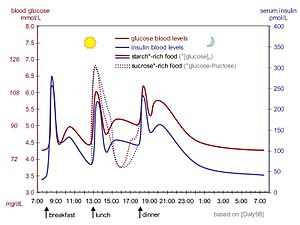
Image via Wikipedia
Can Coffee Reduce The Risk Of Diabetes?
Diabetes is a disease in which the body does not produce or properly use insulin. Insulin is a hormone that is needed to convert sugar, starches and other food into energy needed for daily life. The cause of diabetes continues to be a mystery, although both genetics and environmental factors such as obesity and lack of exercise appear to play roles.
Coffee reduces risk of diabetes
Research suggests that people who drink coffee are less likely to get type 2 diabetes. It isn’t known whether the caffeine or some other ingredient in coffee is responsible for its protective effects.
The researchers wanted to see whether there is a link between diabetes and drinking coffee and green, black, and oolong tea. Participants completed a detailed questionnaire about their health, lifestyle habits, and how much coffee and tea they drank. The questionnaire was repeated at the end of the 5-year follow-up period. [Read more…]



